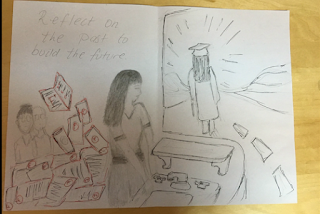It is important to discuss narration as it serves a great purpose in context and interpretation. Authors use many tools to communicate to the readers what characters feel and think. Stream of consciousness narration is one way to communicate these internal thoughts. Another important term for this device is "interior monologue " where the individual thought process of a character associated to their actions. The stream of consciousness narration is marked by a sudden rise of thoughts. There are several advantages of using this writing style in literature. It can regarded as a revolutionary technique as it creates a new concept of reality in literature. This style displays a certain sense of freedom from the constraints of time. According to Daiches, it is a "means of escape from the tyranny of time and place." "traditionalists" as he says, "keep their eyes upon the calendar and clock"Because human consciousness is not a respecter of time, time uses all chronological barriers. That being said,
Naguib Mahfouz further elaborated on his role of a revolutionary arab writer with this use of narration. In the Thief and the Dogs, Mahfouz uses this narration to express Said's thoughts. By alternating between different narrative styles, such as indirect, direct and soliquoy, these shifts in narration allow the reader to dive deeper into Said's thoughts and abruptly bring them back to the reality of his situation. This develops Said as a character; as several traits and emotions are clearly expressed in an efficient manner. It also allows the readers to sympathize with his position and story. For instance, Mahfouz uses this narration during Saids first confrontation with his daughter as a free man. His daughter's rejection evokes feelings of humiliation and anger. This foreshadows Saids motives for revenge and retaliation, and serves as an exposition for these motives. furthermore, it creates a larger impact on the reader as they are exposed to Said's personal hardships. This technique is successfully incorporated throughout the whole book. Through the use of internal monologues and and sudden shifts to different types of third person narration, Said's story is revealed in a circular plot. There is a fine line between past and present, which allows the reader to sense that Said can perhaps be in a certain state of nostalgia; especially during the beginning of the novel. Saids choices and motives are highly influenced from past events, so it was critical for Mahfouz to include the shift to the past by
With the many advantages of a stream of conciseness narration also come several drawbacks. firstly, the story can be exposed to a disregard to material/outer reality. The author is trying so hard to actively reveal the thoughts and emotions of the complex character, that the plot can be.The stream-of-consciousness novelist concentrates only on the reality of the consciousness of his character, shows no interest in events. Thus he fails to render life in its wholeness. Liberating themselves from the tyranny of time, the stream- of-consciousness novelists expose themselves to the danger of chaos and formlessness. Adherence to chronology is a restraint but it also ensures clarity. While focused on the psychological aspects and thoughts of the character, the writer often disregards the character's external situation. This is detrimental as other features such as themes and meaning can completely shift.
